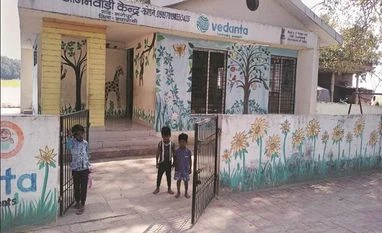Not often does a hamlet of a few hundred families get a prominent directional signboard, usually reserved for district headquarters and big cities on the highway. But Nagepur in the district of Varanasi isn’t an ordinary village. It’s one of the four adopted by Prime Minister (PM) Narendra Modi as part of a Central scheme named Sansad Adarsh Gram Yojana. Adopted in 2016, Modi sanctioned three major projects — an Ambedkar statue with a couple of benches emblazoned with the PM’s name, a water tank with a pipe to most households, and a creche for pre-schoolers called Nand Ghar.
Built as a CSR (corporate social responsibility) project by mining giant Vedanta, the creche dons portraits of Modi in the centre and Jawaharlal Nehru in a corner. Though a lifeline for many daily workers who drop off their tiny tots in the care of anganwaadi workers, two of the most essential facilities remain dysfunctional. The two toilets used by the ladies and the kids are broken and have remained unusable for a couple of years now. The water filter doesn’t work, with the ladies having to fetch drinking water from the village handpump. Complaints to get the toilets in order have not yielded results.
The water tank has bought its own set of woes. A section of the village’s residents has been handed a bill of Rs 400 by the state’s water board despite no visible signs of a meter to gauge usage.
“This is atrocious. I have to pay money to use my own water? A few months ago, water supply was also suspended for 24 hours,” said Munib Ram as he flashes a UP Jal Nigam bill with a hand-scribbled figure on it.
Most of the villages in Varanasi now have tapped water, but wastage remains a big concern. With most people having used a functional tap for the first time in their lives and poorer households having few utensils to store it, it is common to see taps running incessantly whenever supply is turned on.
With many people operating powerlooms in the village, the Yogi Adityanath government’s decision to abolish fixed electricity charges has hit hard many families that are dependent on the profession. Under the Akhilesh Yadav administration, powerlooms had to pay Rs 72 a month, irrespective of usage. “Sometimes bills can go up to Rs 4,000 a month. I make 50 sarees a month and sell each for Rs 100. How do I make a living this way? The cost of cooking oil and LPG cylinders is unbearable. It’s not possible to just survive on free ration,” said Ajay Kumar, a powerloom operator in the village.
A few kilometres from Nagepur lies Jayapur, the first village adopted by Modi after becoming PM in 2014. People here have benefited from Modi’s contribution in changing the face of the village. Though there are pressing concerns over inflation, there is near unanimity about the sweeping transformation of the village after 2014. “We got water pipes, street lights, continuous electricity, and toilets only after Modi adopted this village,” said Rajkumari Devi, a resident of the village.
Vijay Shankar Singh, another resident, concurs.
“There were no roads in the village. Now every street is paved. Our life transformed after Modi adopted this village.”
What’s probably remarkable is that Jayapur has two banks and even a post office — a rarity for a village of its size anywhere in India. Now the village has become a banking hub serving at least 15 other villages in the vicinity. “On average 10 accounts are opened here every day,” said the branch manager at one of the banks.
Further away is Kakarhiya, famous for producing the state’s champion wrestlers. Like the others, Kakarhiya, a rather affluent village, has seen paved roads and solar street lights pop up everywhere. But a common refrain is that Modi has done nothing to improve wrestling infrastructure after adopting it in 2017. The only akhara in the village, which now lies in a dilapidated condition, was built by the Samajwadi Party’s (SP’s) Surender Patel in 2004.
“Our votes are with the BJP every time. But despite that nothing has been done for wrestling in this village. We spend our own money to keep it running. We have been demanding a closed hall and wrestling mats for long. But nothing has changed. Despite practising on mud, we have won medals on mats in national dangals,” said Bikas Singh Rajput, the son of the village’s wrestling coach.
With the strict crackdown on cattle slaughter by the Yogi administration, most villagers complain of extensive damage to crops by stray cattle who otherwise would have been sent to the abattoirs. Ramji Singh, a village elderly, said: “What can Modi do about it? These are our cows, which we let loose after they become unproductive.”
Unlock 30+ premium stories daily hand-picked by our editors, across devices on browser and app.
Pick your 5 favourite companies, get a daily email with all news updates on them.
Full access to our intuitive epaper - clip, save, share articles from any device; newspaper archives from 2006.
Preferential invites to Business Standard events.
Curated newsletters on markets, personal finance, policy & politics, start-ups, technology, and more.
)